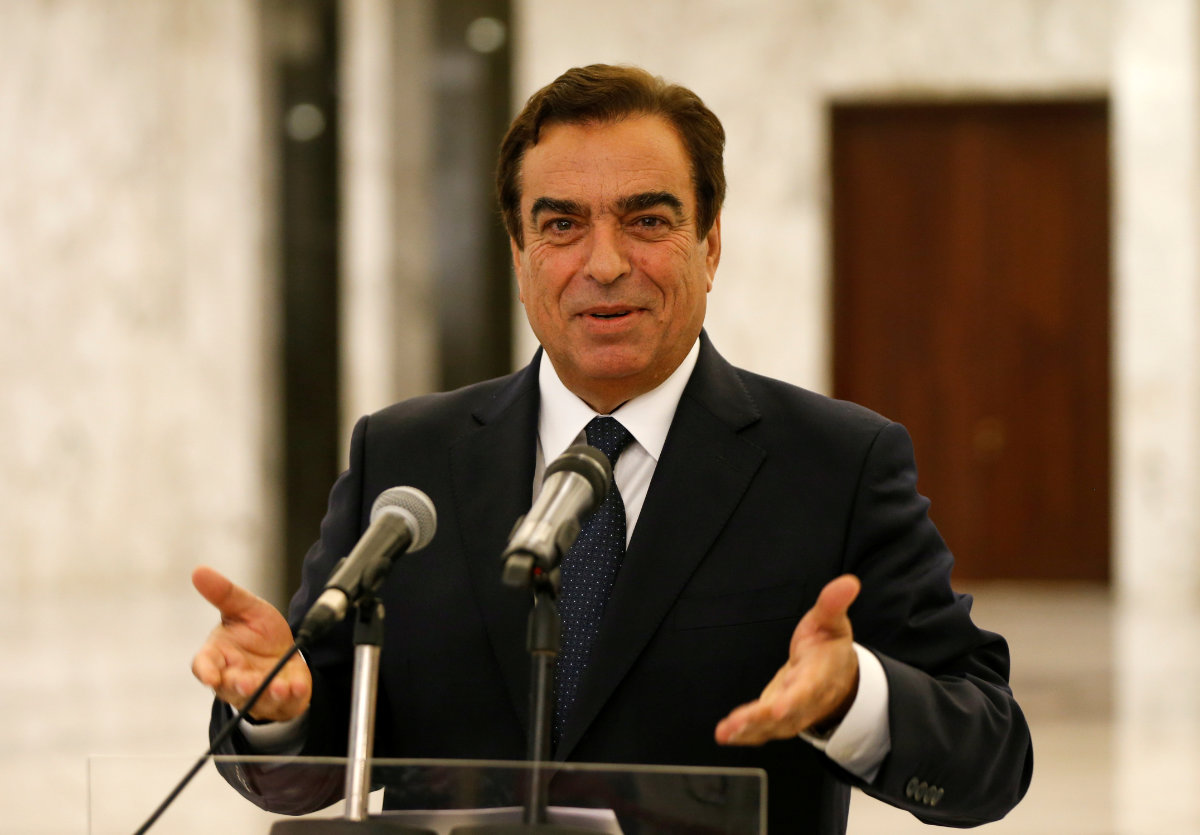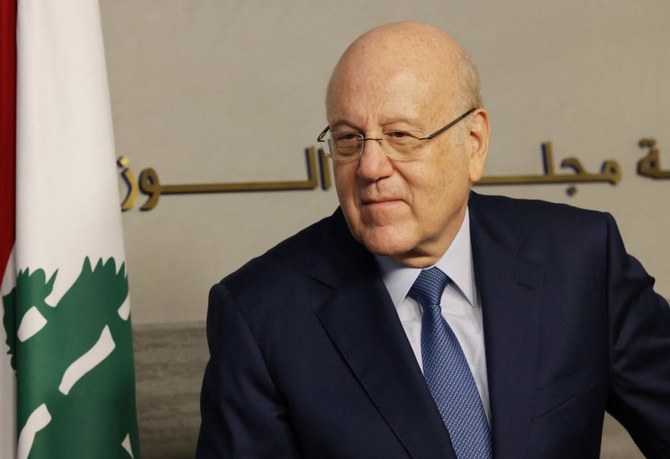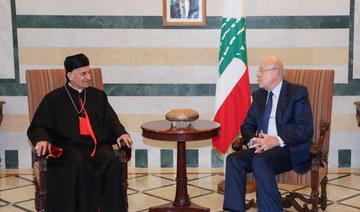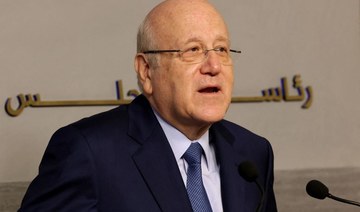BEIRUT: Lebanon’s Prime Minister Najib Mikati on Wednesday distanced himself from comments made by the country’s Information Minister George Kordahi suggesting that the Iran-backed Houthis were “defending themselves” in Yemen.
Kordahi had been responding to a question from the host of “Barlamanasha3b,” an Al Jazeera-affiliated youth TV show, asking about his position on the conflict in the war-torn country.
During the interview recorded on Aug. 5, one month before being appointed information minister, Kordahi said: “The Houthis in Yemen are a resistance movement, defending themselves and not attacking anyone.” He added that the group was acting in self-defense against the “Saudi-UAE attack on Yemen.”
Mikati said: “Kordahi’s statement reflects his personal opinion which we do not accept. These comments do not express the government nor the president’s (Michel Aoun) position on the Yemeni issue. Lebanon is committed to its ties with Arab countries.”
When Kordahi’s remarks later surfaced in a video posted online, they sparked a frenzy on social media and an official protest to the Lebanese Ministry of Foreign Affairs from Yemen’s Ambassador to Lebanon Abdullah Al-Deais.
Kordahi replied by saying he had not intended “in any way, to offend the Kingdom of Saudi Arabia or the Emirates,” and expressed his “love and loyalty to the leaders and people of the two countries.”
He added: “What I said about the war in Yemen being an absurd war that needs to stop, I said it with conviction, not in defense of Yemen, but also out of love for Saudi Arabia and the UAE.”

Lebanon's Information Minister George Kordahi speaks at the presidential palace in Baabda, Lebanon on Sept. 13, 2021. (REUTERS File Photo)
But Al-Deais said Kordahi had only “added insult to injury, as he did not apologize, but rather confirmed what he had said.”
The Yemeni envoy added: “Kordahi’s remarks go against Lebanon’s clear position toward Yemen and its condemnation of the Houthi coup and its support for all relevant Arab and UN resolutions.”
Following a meeting with Aoun on Wednesday, Mikati added: “It is true that we distance ourselves from conflicts, but we do not distance ourselves from any Arab position in solidarity with the Kingdom of Saudi Arabia and the Gulf states.
This position is a constant position, and we look forward to the best relations.
“Kordahi’s comments will not affect the general course, especially since the constants of the Lebanese position on relations with Arab countries were stated in its ministerial declaration. The interview with Kordahi took place before he was appointed minister and was broadcast yesterday,” Mikati said.
Separately, Lebanon’s Ministry of Foreign Affairs pointed out that Kordahi’s comments reflected his “personal stand” and “do not reflect the government’s position.”
In a statement, it said: “The ministry has repeatedly condemned the terrorist attacks on Saudi Arabia and maintains its position in defending the security and safety of its Gulf brothers, for whom it holds love, respect, and appreciation, and refrains from interfering in their internal and external policies.”
The Gulf Cooperation Council noted that Kordahi’s remarks showed his limited knowledge and lack of understanding of the situation in Yemen.
GCC Secretary-General Dr. Nayef bin Falah Al-Hajraf condemned, “the Lebanese minister of information’s defense of the Houthi coup group, while ignoring the intransigence of the Houthi movement against all international efforts to end the Yemeni crisis, and at a time when the Saudi Houthi group is targeting missiles and marches, targeting the defenseless Yemeni people, and preventing relief aid from reaching the stricken areas.”
Saudi Ambassador to Lebanon Walid Al-Bukhari on Wednesday met with Al-Deais.
In a statement issued by the Saudi embassy, Al-Bukhari reaffirmed “the Kingdom’s position on supporting legitimacy in Yemen, reaching a political solution, in accordance with the terms of reference represented by the Gulf Initiative and its executive mechanism, the outcomes of the Comprehensive National Dialogue Conference and the resolution 2216, in order to preserve Yemen’s unity, integrity, respect its sovereignty and independence, and reject any interference in its internal affairs.
“The Iranian-backed Houthis continue hostilities and terrorist operations by firing ballistic missiles and booby-trapped drones to target civilians and civilian objects in Saudi Arabia, violating international and humanitarian law by using civilian populations in Yemeni civilian areas as human shields, and launching booby-trapped boats and remotely marching, posing a serious threat to regional and international security,” he said.
The Saudi envoy highlighted, “the legitimate right of the Saudi-led coalition to restore legitimacy in Yemen, to take and implement the necessary measures to deal with these hostilities and terrorist attacks, and to prevent the smuggling of weapons into these militias that poses a threat to the freedom of maritime navigation and global trade in the Bab Al-Mandab Strait and the Red Sea.”
Al-Bukhari praised “the efficiency” of Saudi air defenses in intercepting and responding to more than 400 ballistic missiles, 791 drones, and at least 205 naval mines.




























